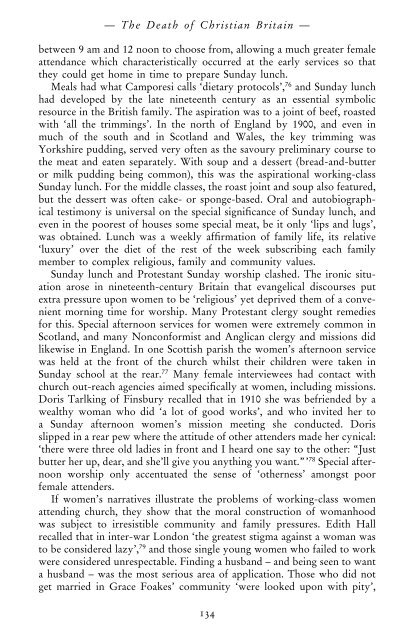The Death of Christian Britain
The Death of Christian Britain
The Death of Christian Britain
Create successful ePaper yourself
Turn your PDF publications into a flip-book with our unique Google optimized e-Paper software.
— <strong>The</strong> <strong>Death</strong> <strong>of</strong> <strong>Christian</strong> <strong>Britain</strong> —<br />
between 9 am and 12 noon to choose from, allowing a much greater female<br />
attendance which characteristically occurred at the early services so that<br />
they could get home in time to prepare Sunday lunch.<br />
Meals had what Camporesi calls ‘dietary protocols’, 76 and Sunday lunch<br />
had developed by the late nineteenth century as an essential symbolic<br />
resource in the British family. <strong>The</strong> aspiration was to a joint <strong>of</strong> beef, roasted<br />
with ‘all the trimmings’. In the north <strong>of</strong> England by 1900, and even in<br />
much <strong>of</strong> the south and in Scotland and Wales, the key trimming was<br />
Yorkshire pudding, served very <strong>of</strong>ten as the savoury preliminary course to<br />
the meat and eaten separately. With soup and a dessert (bread-and-butter<br />
or milk pudding being common), this was the aspirational working-class<br />
Sunday lunch. For the middle classes, the roast joint and soup also featured,<br />
but the dessert was <strong>of</strong>ten cake- or sponge-based. Oral and autobiographical<br />
testimony is universal on the special significance <strong>of</strong> Sunday lunch, and<br />
even in the poorest <strong>of</strong> houses some special meat, be it only ‘lips and lugs’,<br />
was obtained. Lunch was a weekly affirmation <strong>of</strong> family life, its relative<br />
‘luxury’ over the diet <strong>of</strong> the rest <strong>of</strong> the week subscribing each family<br />
member to complex religious, family and community values.<br />
Sunday lunch and Protestant Sunday worship clashed. <strong>The</strong> ironic situation<br />
arose in nineteenth-century <strong>Britain</strong> that evangelical discourses put<br />
extra pressure upon women to be ‘religious’ yet deprived them <strong>of</strong> a convenient<br />
morning time for worship. Many Protestant clergy sought remedies<br />
for this. Special afternoon services for women were extremely common in<br />
Scotland, and many Nonconformist and Anglican clergy and missions did<br />
likewise in England. In one Scottish parish the women’s afternoon service<br />
was held at the front <strong>of</strong> the church whilst their children were taken in<br />
Sunday school at the rear. 77 Many female interviewees had contact with<br />
church out-reach agencies aimed specifically at women, including missions.<br />
Doris Tarlking <strong>of</strong> Finsbury recalled that in 1910 she was befriended by a<br />
wealthy woman who did ‘a lot <strong>of</strong> good works’, and who invited her to<br />
a Sunday afternoon women’s mission meeting she conducted. Doris<br />
slipped in a rear pew where the attitude <strong>of</strong> other attenders made her cynical:<br />
‘there were three old ladies in front and I heard one say to the other: “Just<br />
butter her up, dear, and she’ll give you anything you want.”’ 78 Special afternoon<br />
worship only accentuated the sense <strong>of</strong> ‘otherness’ amongst poor<br />
female attenders.<br />
If women’s narratives illustrate the problems <strong>of</strong> working-class women<br />
attending church, they show that the moral construction <strong>of</strong> womanhood<br />
was subject to irresistible community and family pressures. Edith Hall<br />
recalled that in inter-war London ‘the greatest stigma against a woman was<br />
to be considered lazy’, 79 and those single young women who failed to work<br />
were considered unrespectable. Finding a husband – and being seen to want<br />
a husband – was the most serious area <strong>of</strong> application. Those who did not<br />
get married in Grace Foakes’ community ‘were looked upon with pity’,<br />
134








